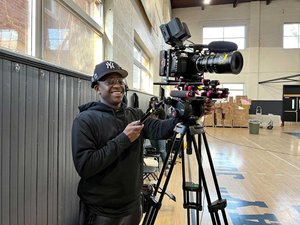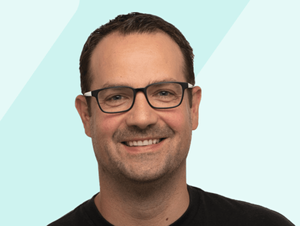
As someone who was born in Iran and brought up in the United Arab Emirates, Raya Bidshahri describes her first impressions of the United States as “ones from the movies.” The 21-year-old told me it was her imagined place where dreams come true. In high school, she dreamed of Broadway, Hollywood and Wall Street. She imagined big cities like Miami and New York. Compared to the United Arab Emirates, she said, it “seemed like the scope of things [in the U.S.] was bigger.”
With that in mind, her parents pooled together their financial resources, and the then-19-year-old became the first of her family to arrive in the U.S. And after almost three years of living here, she said that her eager-eyed impressions of the country proved true.
However, as President Donald Trump continues his crusade against immigration and anti-Muslim sentiment rises, Bidshahri said she is being forced into taking a “safer path.”
Currently, she has split her time between studying neuroscience at Boston University, helping with various startups such as SheWorks!, and working on a social media platform she co-founded called Intelligent Optimism.
"I’d rather go to an immigrant-friendly country and not have to move my business somewhere else."
More recently, she took a step back to start her own edtech company. While the soon-to-be CEO and co-founder wasn’t ready to share more details because it’s expected to launch in a couple of months, she did share her initial plans for its headquarters: Silicon Valley.
But those plans have since changed, based on what she describes as a “risky climate” in the U.S. after Trump issued a now-suspended immigrant and refugee ban in January. As a result, Bidshahri said she is moving to Toronto – and she’s taking her American dream with her.
“It’s not just for 90 days, it’s a trend of where things are going with the Trump administration. It’s risky for me to start a business here,” she said. “I’d rather go to an immigrant-friendly country and not have to move my business somewhere else.”
Trump’s Jan. 27 executive order banned immigrants from seven majority-Muslim countries — Iran, Iraq, Libya, Somalia, Sudan, Syria and Yemen — from entering the U.S. for 90 days. There was a 120-day suspension of all refugees and an indefinite suspension of Syrian refugees. The order had led to the revoking of over 100,000 visas, for foreigners overseas, and in the U.S., reported The New York Times.
Since the initial chaos and protests around the country, a U.S. District Judge has put the ban on hold. After losing an appeal to lift the hold earlier this year, Trump is reportedly planning to issue a revised version of the ban that would only impact those without a visa and those who have never entered the U.S. before, according to the Associated Press.
What’s also a factor for Bidshahri’s decision to move to Canada is the rise of anti-Muslim sentiment that has come with Trump’s administration. While Trump himself has denied that his executive order amounts to a “Muslim ban,” his past comments on the campaign trail strongly suggest he was planning to target Muslims. In addition, some of his advisers have made anti-Muslim comments in the past, including Steve Bannon, Trump’s chief strategist, who has called Islam “the most radical” religion in the world.
The first time I spoke to her, Bidshahri said she was considering Toronto. Now, one week later, she says her move is very likely.
A safer path
For many immigrant students looking to work in the U.S., the idea of a safer path — whether it is moving to another country, pursuing a higher degree, or returning home — is often the result of the reality of the visa system here, according to Anthony Drago Jr., an immigration attorney I spoke to briefly.
“That’s the first hurdle: How are you going to be able to work long-term here in the states, and then have confidence in the fact that you’re making a big investment and starting a company and that you really need to be around to run it?” he said.
Bidshahri’s plan was to apply for an Optional Practical Training visa, also known as an OPT, and then, depending on the climate, either get an H-1B or E2 Investors Visa.
Drago explained the specifics of each of these routes, emphasizing the importance that immigrant entrepreneurs consult an attorney to address any concerns.
OPT’s, which Drago called “essentially a free-ride,” are visas that grant recently graduated students the right to work in the country for 12 months. Students that graduate with a specific degree in STEM can extend their OPT for 24 months, bringing it to a total of 36 months.
"It’s already so difficult for an Iranian citizen to get any kind of visa here."
H-1B visas are essentially company-sponsored visas for specialty occupations, perfect for students who are hired in their field of interest, right out of college. For the past several years these visas have been limited to about 85,000 available: 65,000 for those with bachelor’s degrees, and 20,000 for people with a U.S. Master’s degree or higher. Over 300,000 apply, so the chances of getting an H-1B is slim, and it’s up to a lottery system.
E-2 Investor Visas are a little more common and designed for entrepreneurs like Bidshahri. Basically, an entrepreneur's country of origin must have an agreement with the United States. Her country of origin, Iran, has a treaty agreement with the U.S. so Bidshahri’s next step would be to apply for the visa, invest in a company, and then run the company. It’s a renewable visa, doesn’t require a Green Card and lets family members come from overseas.
“It’s already so difficult for an Iranian citizen to get any kind of visa here,” she said, when going through the different routes.
Before President Barack Obama finished his term in January, his administration finalized a rule for a new "startup visa" alternative called the "International Entrepreneurs Rule," which was designed to help foreign entrepreneurs stay in the U.S. to run their companies. But the rule's future is now up in the air after Trump put a freeze on new and pending regulations.
Canada, by comparison, is a little more flexible, Bidshahri said. “The Start-Up Visa program grants permanent residency to immigrant entrepreneurs while assisting them to become established in Canada,” reads CANADAVISAS.com. The website also explains that the program is designed to “recruit innovative foreign national entrepreneurs who will create new jobs and drive economic growth.”
Additionally, gaining citizenship in Canada is comparatively easier than becoming a citizen in the U.S.
“Having that safety net of a Canadian citizenship is crucial to me as a business owner,” Bidshahri said. “What if i was at a phase in my company where I needed to travel for conferences? I can’t risk that happening. There’s no guarantee that under the Trump administration it won’t happen again.”
A new 'safety net'
The feelings about Trump's administration, based on Drago’s experience with his immigrant clientele, ranges from stressed to confused.
A fraction of people might think that the president is pro-business, he said, and therefore believe that business visas will continue to be safe. He added that another fraction of people are looking at the anti-immigration sentiment and wondering if we’re even going to have immigration in the next few years.
A couple of Bidshahri’s mentors offered to share their opinions with me regarding Bidshahri’s move, and the idea of an immigrant-unfriendly entrepreneurship climate.
Robin Farmanfarmaian, vice president at Palo Alto-based Invicta Medical, explained that Silicon Valley is not a stable environment for someone with an Iranian passport.
“Being an entrepreneur is difficult, and being a female founder even more so. Start with every advantage you can, because only the strong usually survive,” she said.
"The political climate in the U.S. is volatile and uncertain — and unstable — particularly for immigrants."
Rohan Roberts, another co-founder at Intelligent Optimism, said he thinks Bidshahri’s decision to "give up on Silicon Valley and move to Canada is the right one."
"The political climate in the U.S. is volatile and uncertain — and unstable — particularly for immigrants," he said. "The situation in Canada is more amenable to and welcoming of young entrepreneurs like Raya."
Drago shared a degree of optimism in his final comments.
“For some people, from some parts of the world, their worst day in the United States is going to better than their best day [at home]. It’s still the United States of America,” he said. “The entrepreneurial abilities, capabilities and opportunities of starting a business and doing well here are pretty darn good.”
At one point in our conversation, Bidshahri took a moment to reflect on her visionary image of America, an inspirational view that was the impetus for her coming to Boston.
“It’s always been the land of the free, land of opportunity, multiculturalism,” she said. “It seemed like the place you go to kind of put your name on the map. It’s hard to say whether young people right now, after seeing the travel ban, or after seeing the rhetoric against the Muslim community, would feel the same way.”








